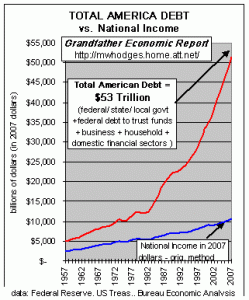Experts Predict Depression
Are we in a depression? Jon Markman of MSN Money eloquently explains the world’s financial dilemma.
Too Late To Avoid A Depression? – MSN Money
Policymakers are quickly running out of time and room for error. And even a brilliant plan — which we haven’t seen yet — could fail without some good luck.
The problem is that the models often fail to accurately forecast human behavior, and politicians regularly screw it all up by ignoring the data and diverting funds to pet projects.
Over the past week, the world’s intellectual, business, government and philanthropic elite emerged from World Economic Forum meetings in Davos, Switzerland, with grim faces and warnings of financial doom.
Credible economic analysts now say there is still a narrow window of time in which policymakers in the United States, Europe and Asia can avoid a meltdown over the next year by immediately coordinating the injection of real financial adrenaline to banks, companies, households and local governments — not just rhetoric and indiscriminate spending. Yet that window is closing fast, and if the right steps are not taken soon it may be shut for years.
The Stimulus Money Could Pay Every One’s Mortgage Payment For A Year
The experts are predicting a possible depression and the economy needs major monetary stimulus.
The government could provide a massive shot of adrenaline to consumer spending by eliminating the consumer’s biggest monthly payment – the mortgage. The one trillion dollars that Congress wants to spend can cover the interest due on every residential mortgage in the country for a year. Here’s ten reasons why the plan would work.
1. According to the Federal Reserve, total home mortgage debt as of the second quarter of 2008 was $10.6 trillion. Assuming an average interest rate of 6.5% the interest payments would only be $689 billion for one year. Equivalent payments could be made to homeowners without mortgages and renters. The total cost would roughly equal the one trillion in stimulus spending that has been proposed by Congress.
2. Eliminating the mortgage payment would allow consumers to strengthen their balance sheets by paying off some debt.
3. Many consumers would effectively have a substantial pay increase since the average mortgage payment can easily consume up to 40% of gross monthly income. It is inevitable that a significant part of the extra cash would be spent. The increased spending would increase demand for goods and services and reduce further job losses.
4. The mortgage payment is the biggest monthly expense for most people. Not having to pay the mortgage for a year would greatly boost consumer confidence. Restored confidence could stimulate future spending after the one year mortgage holiday ends.
5. Homeowners who are in arrears on their mortgages would be given an opportunity to catch up.
6. The default problem for the banks would be temporarily eliminated since the mortgage payment would be made by the government. Not having a mortgage payment for a year would strengthen the consumer’s finances thereby lessening the number of defaults after the mortgage holiday is over.
7. The American consumer knows how to spend – he just does not have the money right now. Give it to him and let it be spent with no strings attached.
8. Millions of individual consumers will spend or invest the money more wisely than bureaucrats in Washington.
9. Those homeowners who have lost their jobs and are now struggling to pay their mortgages will be given immediate financial relief.
10. This plan would allow renters to save their stimulus payments for a down payment on a home, thereby providing support to the housing market.
If the Congress wants to borrow one trillion dollars that the American taxpayer will eventually have to pay back, then put that money directly into our pockets with a Mortgage Holiday. We do not need Congress to spend our money for us.
